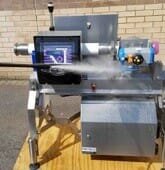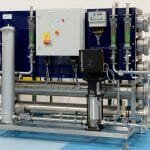Stand P191
According to the latest YouGov research, 14% of the UK population consider themselves flexitarians, meaning they only occasionally eat meat[i]. Along with a rise of veganism, increased product ranges, changing consumer tastes, new sustainable packaging formats and a heightened focus on food safety and allergens are pushing food and drink manufacturers to consider the future flexibility of their contaminant inspection equipment.
At this year’s Foodex Show on stand P191, Fortress Technology will showcase how it’s staying on top of these evolving trends with its range of hygienic, easy clean and ‘Never Obsolete’ range of gravity fed, horizontal conveyor and pipeline metal detectors.
Designed to enhance food safety and safeguard brand integrity, Fortress is exhibiting three systems designed to flex to changing demographics and eating habits. From meat free alternatives to single-serve snacks or compostable packaging formats, all Fortress inspection machines have been specifically designed to help food manufacturers keep pace with the new retail trends and codes of practice, adapt to different SKUs as well as reduce waste, product giveaway and eradicate false rejects.
In the last 20 years, the number of single person households has increased by a fifth. In 2018, the number of people living alone exceeded 8 million, up from 7.7 million in the previous year[ii]. These changing demographics have led to a rise in preference for both convenience and health. Additionally, current lifestyle and working patterns are accelerating changes to traditional eating habits. All this is driving new product development (NPD), particularly in the single-serve market.
To accurately inspect single-serve portions and ensure they are free from contamination, producers need to ensure their metal detection machinery is sophisticated enough to cope with not only different kinds of foodstuffs simultaneously, but also different packaging formats.
Fortress managing director Phil Brown explains: “Each type of food – protein, salad, vegetable, carbohydrate, etc. – has different conductive properties and therefore behaves differently in a metal detector. And if each item is individually wrapped, then the overall packaging will be thicker, and sensitivity might be affected. Fortress metal detectors can run multiple frequencies simultaneously. Making it ideal for these kind of elevated convenience products, as the machines can accurately inspect a variety of conductivities at the same time.”
Manufacturers catering to the rapid rise in UK ‘flexitarian’ eating habits also need to keep in mind processing challenges. Just like snack products, the ingredients used to make meat alternatives are often dropped into a drum before being pressed into the required shape. The use of gravity metal detectors at this processing stage can help prevent metal contaminants being flattened and crushed in the drum rollers.
Allergens are also on the rise. By 2025, it’s predicted that half of all Europeans will be affected by at least one allergic disorder[iii]. With compliance demanding the highest levels of sanitation, the IP69K-rated Hygienic Fortress Pipeline now has 60% less surface area, helping to address cross contamination and the spread of allergen risks.
Visit Foodex 2020, stand P191 to find out more.





